高考英语二轮复习课件:情态动词(共44张PPT)
文档属性
| 名称 | 高考英语二轮复习课件:情态动词(共44张PPT) |
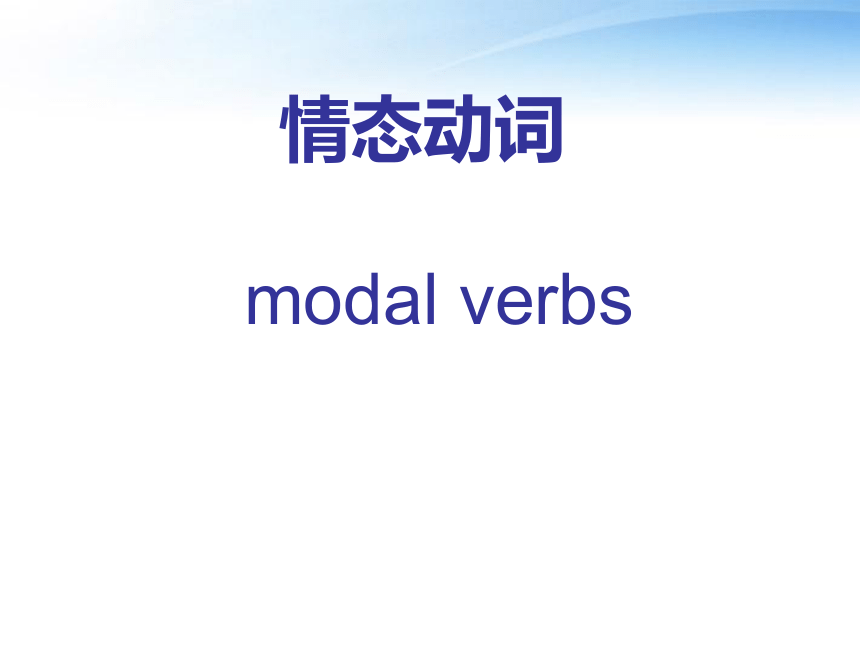
|
|
| 格式 | zip | ||
| 文件大小 | 451.5KB | ||
| 资源类型 | 教案 | ||
| 版本资源 | 通用版 | ||
| 科目 | 英语 | ||
| 更新时间 | 2019-07-29 00:00:00 | ||
图片预览


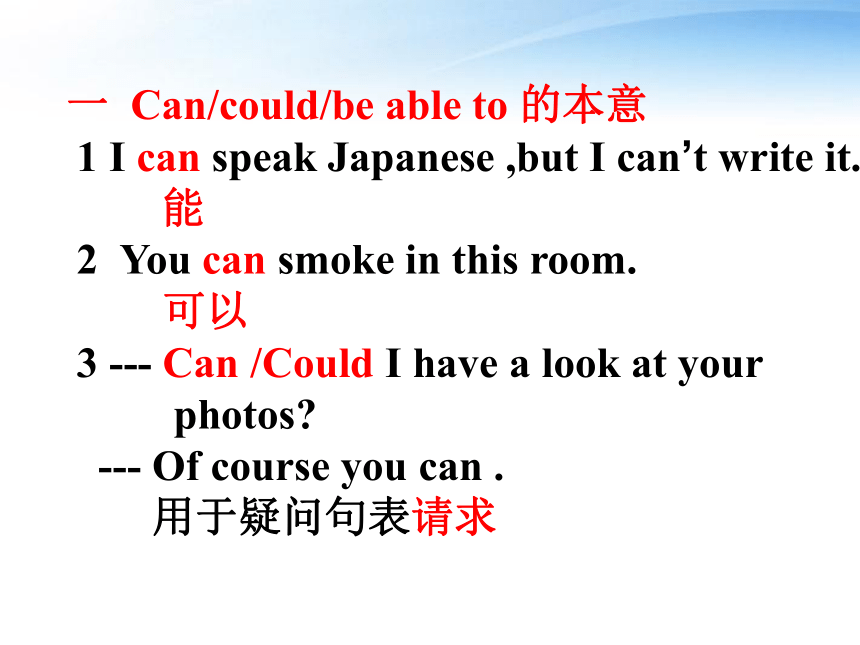

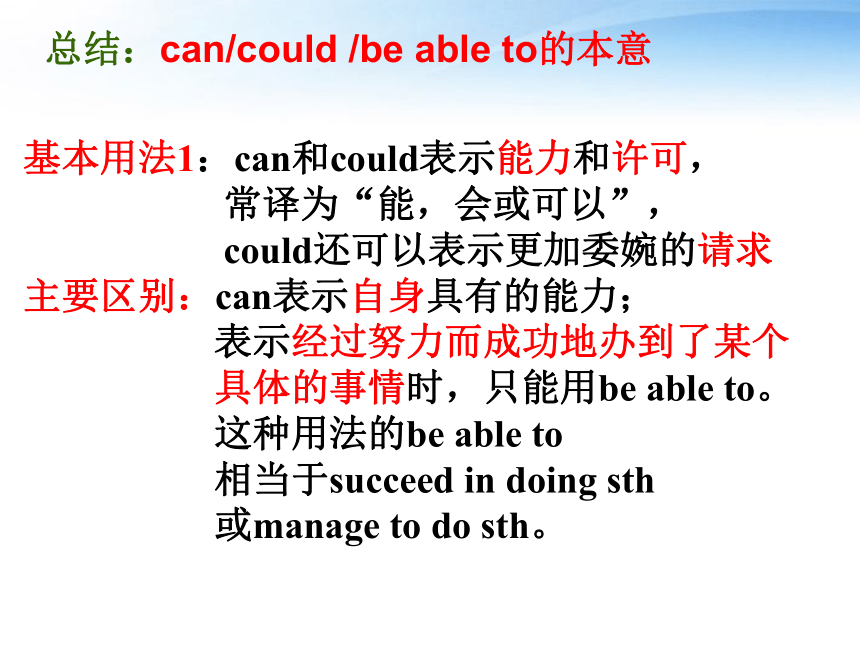
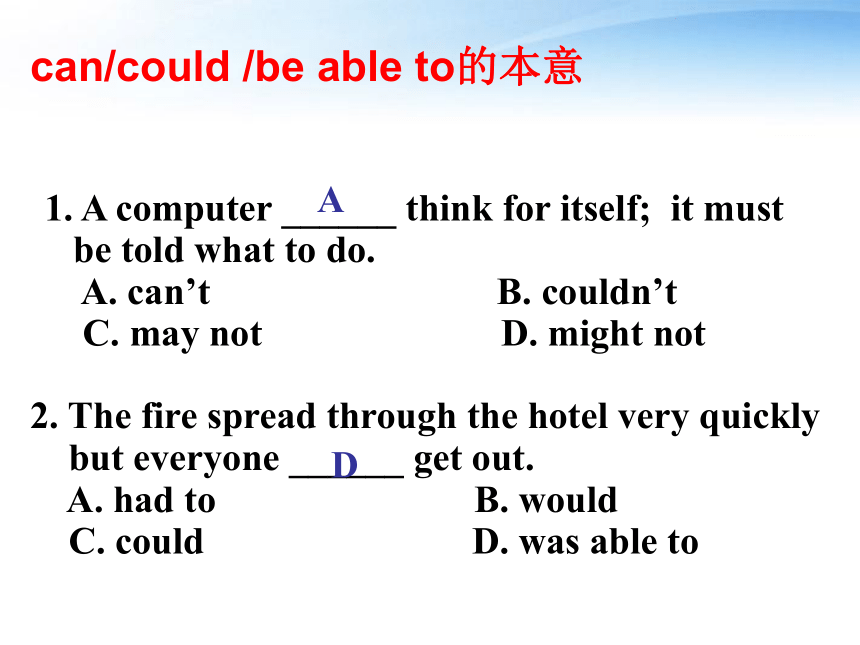
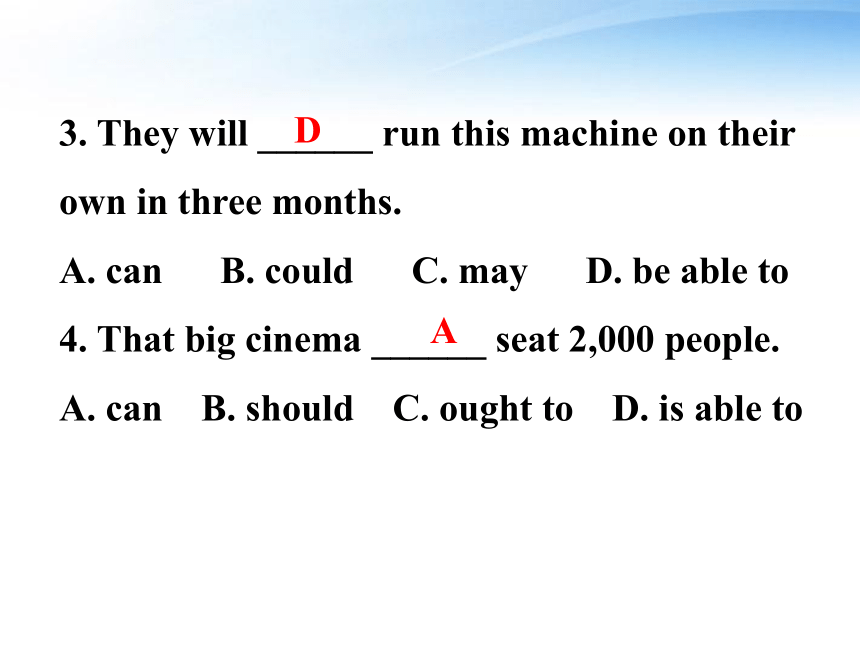
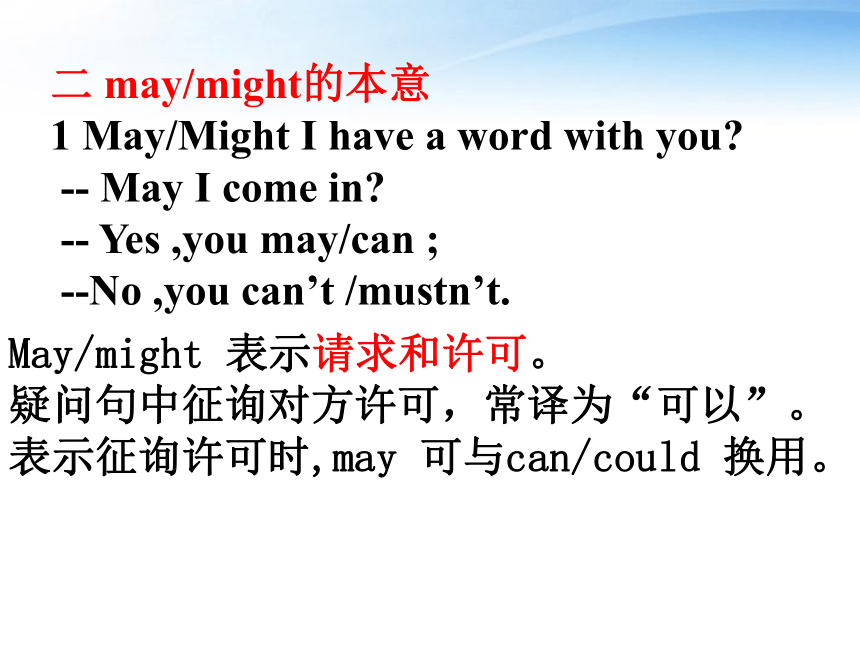
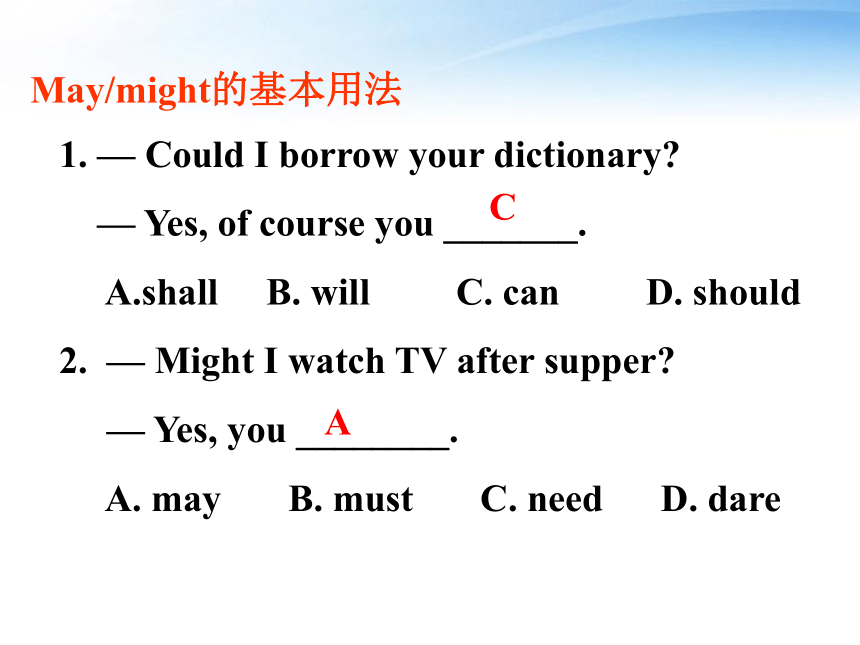
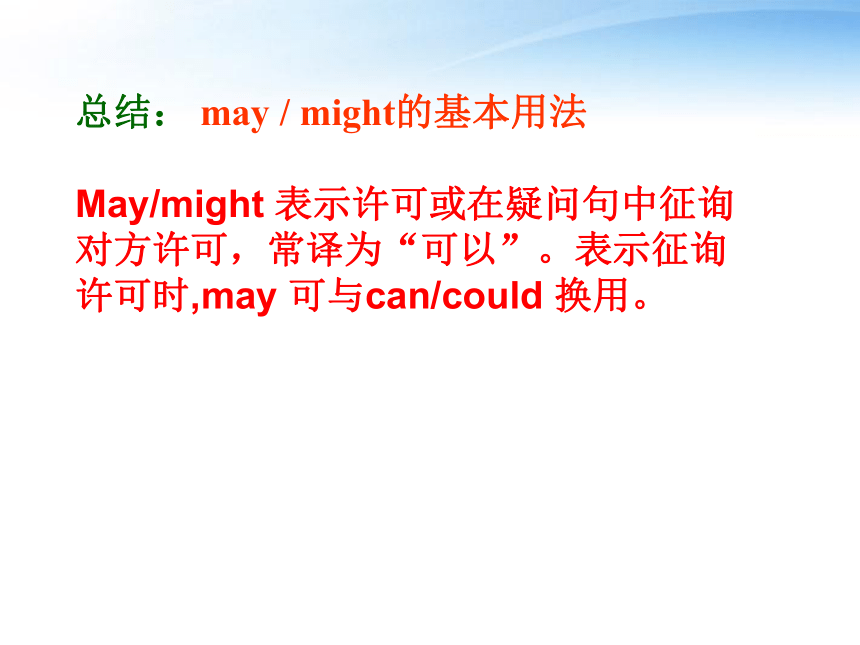
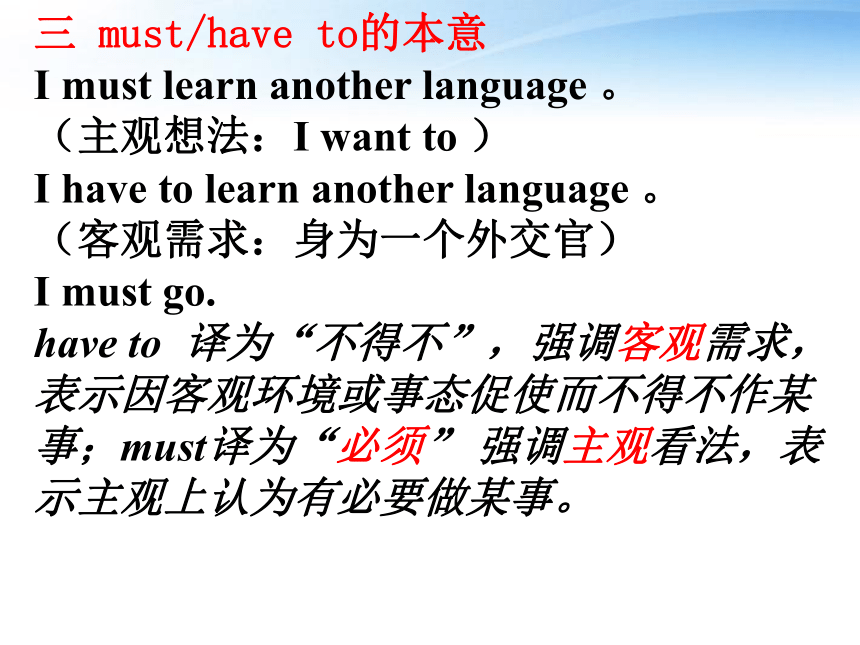
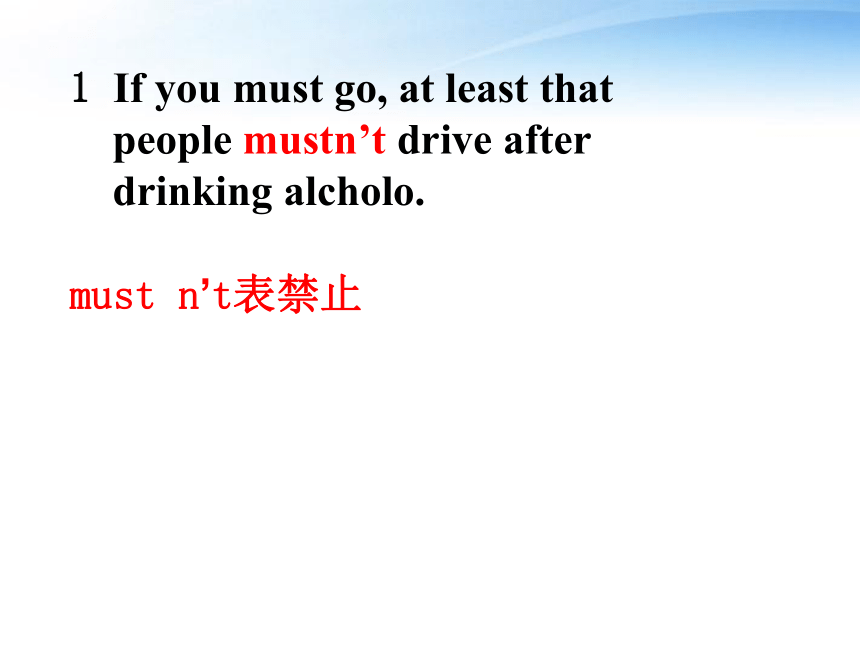
文档简介
课件44张PPT。
情态动词
modal verbs情态动词的本意一 Can/could/be able to 的本意
1 I can speak Japanese ,but I can’t write it.
能
2 You can smoke in this room.
可以
3 --- Can /Could I have a look at your
photos?
--- Of course you can .
用于疑问句表请求
4 He couldn't climb the mountain 。
(没有能力爬,因而也没有爬)
5 He was not able to climb the mountain 。
(尝试爬过,但是没能爬上去) 1 can表示自身具有的能力;
2 表示经过努力而成功地办到了某个具体的
事情时,只能用be able to。
这种用法的be able to 相当于
succeed in doing sth 或manage to do sth。 总结:can/could /be able to的本意
基本用法1:can和could表示能力和许可,
常译为“能,会或可以”,
could还可以表示更加委婉的请求
主要区别:can表示自身具有的能力;
表示经过努力而成功地办到了某个
具体的事情时,只能用be able to。
这种用法的be able to
相当于succeed in doing sth
或manage to do sth。
1. A computer ______ think for itself; it must
be told what to do.
A. can’t B. couldn’t
C. may not D. might not
2. The fire spread through the hotel very quickly
but everyone ______ get out.
A. had to B. would
C. could D. was able toA D can/could /be able to的本意3. They will ______ run this machine on their
own in three months.
A. can B. could C. may D. be able to
4. That big cinema ______ seat 2,000 people.
A. can B. should C. ought to D. is able toD A
二 may/might的本意
1 May/Might I have a word with you?
-- May I come in?
-- Yes ,you may/can ;
--No ,you can’t /mustn’t.
May/might 表示请求和许可。
疑问句中征询对方许可,常译为“可以”。
表示征询许可时,may 可与can/could 换用。May/might的基本用法1. — Could I borrow your dictionary?
— Yes, of course you _______.
A.shall B. will C. can D. should
2. — Might I watch TV after supper?
— Yes, you ________.
A. may B. must C. need D. dare
A C 总结: may / might的基本用法
May/might 表示许可或在疑问句中征询
对方许可,常译为“可以”。表示征询
许可时,may 可与can/could 换用。三 must/have to的本意
I must learn another language 。
(主观想法:I want to )
I have to learn another language 。
(客观需求:身为一个外交官)
I must go.
have to 译为“不得不”,强调客观需求,
表示因客观环境或事态促使而不得不作某
事;must译为“必须” 强调主观看法,表
示主观上认为有必要做某事。
1 If you must go, at least that
people mustn’t drive after
drinking alcholo.
must n’t表禁止
请用must/have to填空
1 We _________ get up early to catch
the train.
2 I think we _________ improve our
English stuides.
3 Young people under the age of
________ drink wine.
have tomustmustn’t总结:must/have to的基本用法
基本用法一
have to 译为“不得不”,强调客观需
求,表示因客观环境或事态促
使而不得不作某事;
must译为“必须” 强调主观看法,
表示主观上认为有必要做某事。
注意:mustn’t表严禁四 shall的本意
1 You shall have a lot of money .
(允诺)
2 Each citizen shall carry his
identification card when travelling.
(规定)
3 You shall arrive there before sunset .
(命令)
4 If you don't behave yourself ,you
shall be punished .
(威胁)5 He shall get what he deserves .
(警告)
6 The National Party congress shall
be held every five years.
用于第三人称做主语的陈述句,在条约、规定、法令等文件中的义务或规定
7— What time shall I pick you up at
your house tomorrow , sir?
-- I haven’t decided on the time.
But I will call you.
用于第一、三人称的疑问句,表示说话人征求对方的意见或向对方请示
总结:shall的本意
基本用法1.
shall可以用在第二、三人称的陈述
句,表示说话人的警告、允诺、命令、威胁或
必然结果等;
基本用法2 :
用于第三人称做主语的陈述句,
在条约、规定、法令等文件中的义务或规定
基本用法3:
用于第一、三人称的疑问句,表示
说话人征求对方的意见或向对方请示
五 should 的本意
1 The report is written after careful
investigation , so it should be reliable .
这份报告是经过周密调查写成的,
所以该是可靠的。
should 的本意:“应该、按道理应该”六 Will/ would的基本用法
1 Will you call back later,please?
2 Would you like a cap of coffee?
表示请求、建议,用于第二人称疑问
句中,would比will的语气更委婉。
3 I will never do that again.
表示意志,愿望和决心,有“愿;要”
之意,would表示过去的意愿和决心
4 Fish will die without water.鱼没有水就会死。
5 On Sunday he would g o to the park to play
chess.以前每到星期天他总是到公园下棋。
表示习惯性动作或某种倾向,
would表示过去某种习惯性动作或某种倾向Shall/will/would的基本用法
请用shall/will/would填空
11. He ______ be punished if he disobeys.
如果他不服从, 就要受到惩罚.
12. We are not going to quarrel at all if you ____
only let me speak.
只要你让我说话, 我们根本就不会吵架.
13. --Sir, ____ he go or stay?
--Let him go.
A. will B. shall C. might D. couldshallwillB 14. The door _______ open.
这门经常打不开.
15. Tom ______ stay in his small garden for
a long time every day in the past.
A. could B. might C. should D. would
16. You _____ have the book after I read it.
我看完以后一定把这本书给你.
won’tD shall七 ought to/need/dare的本意
ought to 的基本用法:
“应该、 按道理应该”
need表
需要
dare表
“敢”
I daren’t ask her for a rise. 我不敢请求她加薪.
How did you dare to tell her that?
I wonder whether he dare stand up in public.
I don’t know how she dares to wear that dress.
Do you need any help?
I wonder whether he need send it immediately.
I need hardly tell you that the work is dangerous.
The garden doesn’t need watering at the moment.
You needn’t finish that work today.总结:
注意need和dare做为情态动词和实义动词的区别
need/dare作为情态动词
陈述句形式:主语+need/dare+do
否定句形式:主语+need/dare+not+do
一般疑问句形式:Need/dare +主语+do
need/dare作为实义动词
陈述句形式:主语+need to do
否定句形式:主语+don‘t/doesn’t/didn’t need to do
一般疑问句形式:Do/Does/Did+主语+need to do判断正误:
How dare you say such a thing?
How dare you to say such a thing?He daren’t to speak English before such a
crowd, did he?
He daren’t speak English before such a
crowd, dare he?1 May/Might I have a word with you?
-- May I come in?-- Yes ,you may/can ;
--No ,you can’t /mustn’t.
May/might 表示请求和许可。疑问句中征询对方许可,常译为“可以”。表示征询许可时,may 可与can/could 换
用。对其一般疑问句的肯定回答时可用may/can ,但否定
回答时要用mustn’t或can’t.7— What time shall I pick you up at your house tomorrow , sir? -- I haven’t decided on the time. But I will call you.
用于第一、三人称的疑问句,表示说话人征求对方的意见或向对方请示
1 Will you call back later,please?
2 Would you like a cap of coffee?
表示请求、建议,用于第二人称疑问句中,would比will的语气更委婉。情态动词特殊用法1 He can be very friendly at times 。
2 Why must you be so stubborn
3 Must you shout so loudly?
4 May you succeed!
5 It seems unfair that this should happen to me .
总结
1 can 和 could 可以翻译为”有时会”。
2 must译为“偏要”“偏偏”,指做令人不快的事
3 may常用于祈使句,表示祝愿
4 should表示惊讶,难以置信或不应该发生的事,
多译为′竟然`
情态动词表推测不同的“肯定”程度可按下列层次排列:
He is at home. (事实)
He must be at home.(非常肯定的推断)
He could be at home.(很可能)
He may be at home.(仅仅可能而已)
He might be at home.(或许, 非常不确定)
He might not be at home.(也许不在家)
He may not be at home. (比might可能)
He couldn’t be at home.(很可能不在家)
He can’t be at home.(一定不在家)
He isn't at home.(事实)
总结:
1 must –can/could – may/might
可能性 由大到小
2 must/can/could/may/might+do
表示对现在的推测
3 must/ can/ could /may/might+have done
表示对过去的推测 1. I don't know where she is, she _______ be in
Wuhan.
3. The road is wet. It ________________ last night.
(rain)
maymust have rained6. ---Linda has gone to work, but her bicycle is
still here.
---She _____________________ (go) by bus.
must have gone高考考题:
1. I thought you _____like something to read, so
I have brought you some books.
A. may B. might C. would D. must
2. Where is my pen? I ____it.
A. might lose B. would have lost
C. should have lost D. must have lost
3. I didn’t hear the phone. I ___asleep
A. must be B. must have been
C. should be D. should have beenB D B 4. ---There were already five people in the car,
but they managed to take me as well.
----It ____a comfortable journey
A. can’t be B. shouldn’t be
C. mustn’t have been D. couldn’t have been
D 情态动词中的固定短语
一 should/ought to have done
shouldn’t/ought not to have done
1、We should have studied last night, but we went to the concert instead .
2 He shouldn’t /ought not to have throw the old clothes away.
总结:should/ought to have done
过去本来应该(而实际上并没有…)
should not/ought not to have done
本不应该 …而实际上却已经…”
二 could have done
1、If you could have finished the task in time,you could have been promoted.
如果你当时能如期完成那任务的话,你可能已提升了(实际上没有被提升)
2 I could have been five years old when I left my
home.
A 表示"过去本来能够…" 实际上没能做…。
B 表示对过去的推测
三 need not have done
1、I need not have got up so early .
我本来不必要那么早起床的(事实上早已起床)
2、I need not have waited for the train for an hour. 我本来不必要等一个小时的火车。
(事实上已经等了一个小时)
本来不必做某事而实际做了
Practice1.Mr White ____ at 8:30 for the meeting, but he didn’t turn up.
A. should have arrived
B. should arrive
C. should have had arrived
D. should be arriving1 You can't praise him too much 。
cannot /can't ..too/enough
意思“越…越…”“无论…也不为过”。
1 I cannot wait to read the book 。
“cannot wait to do sth ”意思是“be eager to … 急于做”1 She may well say so .
2 It is very late ,so you may / might as well go to bed .
We may / might as well have something to eat .
may /might well+动词原形意思为“理应,有足够的理由”;
may / might as well +动词原形
意思为“还不如,不妨,还是…的好”1 We can’t help but wait a little longer.
can’t but do sth;
can’t help but do ;
can’t choose but do ;
can do nothing but do ;
have no choice but to do表不得不、只好
bye-bye
情态动词
modal verbs情态动词的本意一 Can/could/be able to 的本意
1 I can speak Japanese ,but I can’t write it.
能
2 You can smoke in this room.
可以
3 --- Can /Could I have a look at your
photos?
--- Of course you can .
用于疑问句表请求
4 He couldn't climb the mountain 。
(没有能力爬,因而也没有爬)
5 He was not able to climb the mountain 。
(尝试爬过,但是没能爬上去) 1 can表示自身具有的能力;
2 表示经过努力而成功地办到了某个具体的
事情时,只能用be able to。
这种用法的be able to 相当于
succeed in doing sth 或manage to do sth。 总结:can/could /be able to的本意
基本用法1:can和could表示能力和许可,
常译为“能,会或可以”,
could还可以表示更加委婉的请求
主要区别:can表示自身具有的能力;
表示经过努力而成功地办到了某个
具体的事情时,只能用be able to。
这种用法的be able to
相当于succeed in doing sth
或manage to do sth。
1. A computer ______ think for itself; it must
be told what to do.
A. can’t B. couldn’t
C. may not D. might not
2. The fire spread through the hotel very quickly
but everyone ______ get out.
A. had to B. would
C. could D. was able toA D can/could /be able to的本意3. They will ______ run this machine on their
own in three months.
A. can B. could C. may D. be able to
4. That big cinema ______ seat 2,000 people.
A. can B. should C. ought to D. is able toD A
二 may/might的本意
1 May/Might I have a word with you?
-- May I come in?
-- Yes ,you may/can ;
--No ,you can’t /mustn’t.
May/might 表示请求和许可。
疑问句中征询对方许可,常译为“可以”。
表示征询许可时,may 可与can/could 换用。May/might的基本用法1. — Could I borrow your dictionary?
— Yes, of course you _______.
A.shall B. will C. can D. should
2. — Might I watch TV after supper?
— Yes, you ________.
A. may B. must C. need D. dare
A C 总结: may / might的基本用法
May/might 表示许可或在疑问句中征询
对方许可,常译为“可以”。表示征询
许可时,may 可与can/could 换用。三 must/have to的本意
I must learn another language 。
(主观想法:I want to )
I have to learn another language 。
(客观需求:身为一个外交官)
I must go.
have to 译为“不得不”,强调客观需求,
表示因客观环境或事态促使而不得不作某
事;must译为“必须” 强调主观看法,表
示主观上认为有必要做某事。
1 If you must go, at least that
people mustn’t drive after
drinking alcholo.
must n’t表禁止
请用must/have to填空
1 We _________ get up early to catch
the train.
2 I think we _________ improve our
English stuides.
3 Young people under the age of
________ drink wine.
have tomustmustn’t总结:must/have to的基本用法
基本用法一
have to 译为“不得不”,强调客观需
求,表示因客观环境或事态促
使而不得不作某事;
must译为“必须” 强调主观看法,
表示主观上认为有必要做某事。
注意:mustn’t表严禁四 shall的本意
1 You shall have a lot of money .
(允诺)
2 Each citizen shall carry his
identification card when travelling.
(规定)
3 You shall arrive there before sunset .
(命令)
4 If you don't behave yourself ,you
shall be punished .
(威胁)5 He shall get what he deserves .
(警告)
6 The National Party congress shall
be held every five years.
用于第三人称做主语的陈述句,在条约、规定、法令等文件中的义务或规定
7— What time shall I pick you up at
your house tomorrow , sir?
-- I haven’t decided on the time.
But I will call you.
用于第一、三人称的疑问句,表示说话人征求对方的意见或向对方请示
总结:shall的本意
基本用法1.
shall可以用在第二、三人称的陈述
句,表示说话人的警告、允诺、命令、威胁或
必然结果等;
基本用法2 :
用于第三人称做主语的陈述句,
在条约、规定、法令等文件中的义务或规定
基本用法3:
用于第一、三人称的疑问句,表示
说话人征求对方的意见或向对方请示
五 should 的本意
1 The report is written after careful
investigation , so it should be reliable .
这份报告是经过周密调查写成的,
所以该是可靠的。
should 的本意:“应该、按道理应该”六 Will/ would的基本用法
1 Will you call back later,please?
2 Would you like a cap of coffee?
表示请求、建议,用于第二人称疑问
句中,would比will的语气更委婉。
3 I will never do that again.
表示意志,愿望和决心,有“愿;要”
之意,would表示过去的意愿和决心
4 Fish will die without water.鱼没有水就会死。
5 On Sunday he would g o to the park to play
chess.以前每到星期天他总是到公园下棋。
表示习惯性动作或某种倾向,
would表示过去某种习惯性动作或某种倾向Shall/will/would的基本用法
请用shall/will/would填空
11. He ______ be punished if he disobeys.
如果他不服从, 就要受到惩罚.
12. We are not going to quarrel at all if you ____
only let me speak.
只要你让我说话, 我们根本就不会吵架.
13. --Sir, ____ he go or stay?
--Let him go.
A. will B. shall C. might D. couldshallwillB 14. The door _______ open.
这门经常打不开.
15. Tom ______ stay in his small garden for
a long time every day in the past.
A. could B. might C. should D. would
16. You _____ have the book after I read it.
我看完以后一定把这本书给你.
won’tD shall七 ought to/need/dare的本意
ought to 的基本用法:
“应该、 按道理应该”
need表
需要
dare表
“敢”
I daren’t ask her for a rise. 我不敢请求她加薪.
How did you dare to tell her that?
I wonder whether he dare stand up in public.
I don’t know how she dares to wear that dress.
Do you need any help?
I wonder whether he need send it immediately.
I need hardly tell you that the work is dangerous.
The garden doesn’t need watering at the moment.
You needn’t finish that work today.总结:
注意need和dare做为情态动词和实义动词的区别
need/dare作为情态动词
陈述句形式:主语+need/dare+do
否定句形式:主语+need/dare+not+do
一般疑问句形式:Need/dare +主语+do
need/dare作为实义动词
陈述句形式:主语+need to do
否定句形式:主语+don‘t/doesn’t/didn’t need to do
一般疑问句形式:Do/Does/Did+主语+need to do判断正误:
How dare you say such a thing?
How dare you to say such a thing?He daren’t to speak English before such a
crowd, did he?
He daren’t speak English before such a
crowd, dare he?1 May/Might I have a word with you?
-- May I come in?-- Yes ,you may/can ;
--No ,you can’t /mustn’t.
May/might 表示请求和许可。疑问句中征询对方许可,常译为“可以”。表示征询许可时,may 可与can/could 换
用。对其一般疑问句的肯定回答时可用may/can ,但否定
回答时要用mustn’t或can’t.7— What time shall I pick you up at your house tomorrow , sir? -- I haven’t decided on the time. But I will call you.
用于第一、三人称的疑问句,表示说话人征求对方的意见或向对方请示
1 Will you call back later,please?
2 Would you like a cap of coffee?
表示请求、建议,用于第二人称疑问句中,would比will的语气更委婉。情态动词特殊用法1 He can be very friendly at times 。
2 Why must you be so stubborn
3 Must you shout so loudly?
4 May you succeed!
5 It seems unfair that this should happen to me .
总结
1 can 和 could 可以翻译为”有时会”。
2 must译为“偏要”“偏偏”,指做令人不快的事
3 may常用于祈使句,表示祝愿
4 should表示惊讶,难以置信或不应该发生的事,
多译为′竟然`
情态动词表推测不同的“肯定”程度可按下列层次排列:
He is at home. (事实)
He must be at home.(非常肯定的推断)
He could be at home.(很可能)
He may be at home.(仅仅可能而已)
He might be at home.(或许, 非常不确定)
He might not be at home.(也许不在家)
He may not be at home. (比might可能)
He couldn’t be at home.(很可能不在家)
He can’t be at home.(一定不在家)
He isn't at home.(事实)
总结:
1 must –can/could – may/might
可能性 由大到小
2 must/can/could/may/might+do
表示对现在的推测
3 must/ can/ could /may/might+have done
表示对过去的推测 1. I don't know where she is, she _______ be in
Wuhan.
3. The road is wet. It ________________ last night.
(rain)
maymust have rained6. ---Linda has gone to work, but her bicycle is
still here.
---She _____________________ (go) by bus.
must have gone高考考题:
1. I thought you _____like something to read, so
I have brought you some books.
A. may B. might C. would D. must
2. Where is my pen? I ____it.
A. might lose B. would have lost
C. should have lost D. must have lost
3. I didn’t hear the phone. I ___asleep
A. must be B. must have been
C. should be D. should have beenB D B 4. ---There were already five people in the car,
but they managed to take me as well.
----It ____a comfortable journey
A. can’t be B. shouldn’t be
C. mustn’t have been D. couldn’t have been
D 情态动词中的固定短语
一 should/ought to have done
shouldn’t/ought not to have done
1、We should have studied last night, but we went to the concert instead .
2 He shouldn’t /ought not to have throw the old clothes away.
总结:should/ought to have done
过去本来应该(而实际上并没有…)
should not/ought not to have done
本不应该 …而实际上却已经…”
二 could have done
1、If you could have finished the task in time,you could have been promoted.
如果你当时能如期完成那任务的话,你可能已提升了(实际上没有被提升)
2 I could have been five years old when I left my
home.
A 表示"过去本来能够…" 实际上没能做…。
B 表示对过去的推测
三 need not have done
1、I need not have got up so early .
我本来不必要那么早起床的(事实上早已起床)
2、I need not have waited for the train for an hour. 我本来不必要等一个小时的火车。
(事实上已经等了一个小时)
本来不必做某事而实际做了
Practice1.Mr White ____ at 8:30 for the meeting, but he didn’t turn up.
A. should have arrived
B. should arrive
C. should have had arrived
D. should be arriving1 You can't praise him too much 。
cannot /can't ..too/enough
意思“越…越…”“无论…也不为过”。
1 I cannot wait to read the book 。
“cannot wait to do sth ”意思是“be eager to … 急于做”1 She may well say so .
2 It is very late ,so you may / might as well go to bed .
We may / might as well have something to eat .
may /might well+动词原形意思为“理应,有足够的理由”;
may / might as well +动词原形
意思为“还不如,不妨,还是…的好”1 We can’t help but wait a little longer.
can’t but do sth;
can’t help but do ;
can’t choose but do ;
can do nothing but do ;
have no choice but to do表不得不、只好
bye-bye
